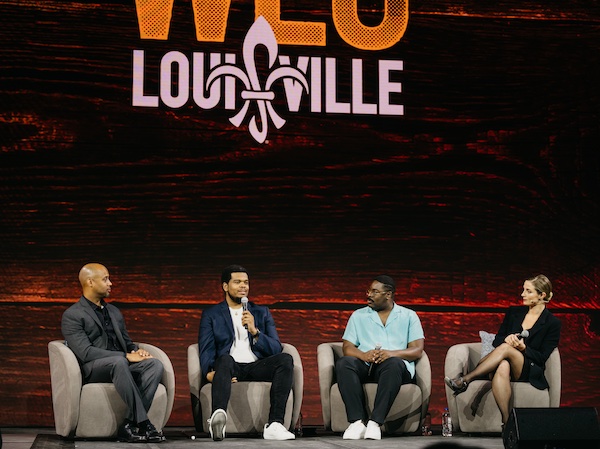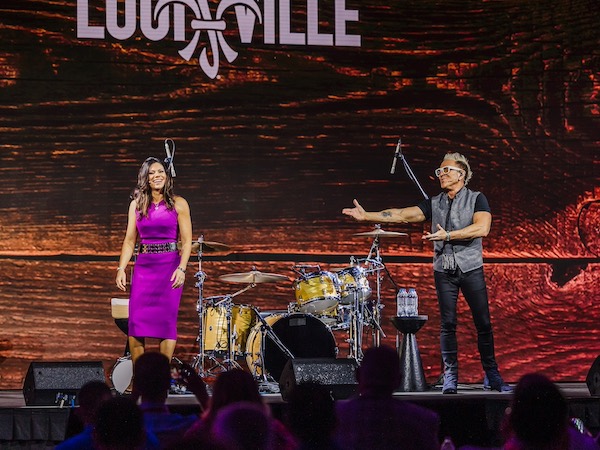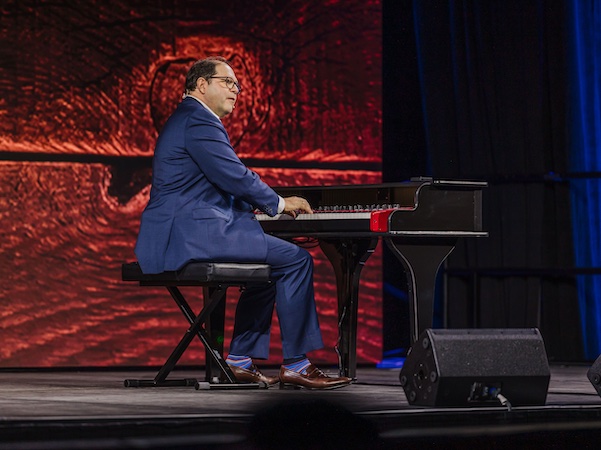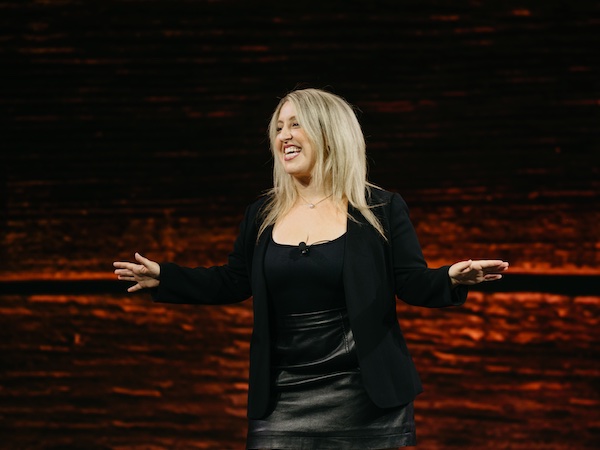Presenters on the main stage at last week’s WEC24 shared inspiring messages of overcoming seemingly insurmountable obstacles to achieve great success.
“I thought I would be a fabulous flying monkey” might be one of the more unorthodox comments ever made during a keynote presentation. But that was the experience of Broadway actress Jessica Lee Goldyn.
Goldyn was one of three Broadway stars—along with Fergie Phillippe and Kyle Taylor Parker—participating in “Broadway to Boardroom: Business Best Practices from Backstage” at MPI’s World Education Congress (WEC), May 20-22 in Louisville, Ky.
WEC’s overall theme was “Craft Your Experience,” and the event featured the experiences and talents of musicians, actors and comedians to drive home the point that constant exposure to potential rejection doesn’t isn’t an insurmountable obstacle to great accomplishment. Just as the show must go on, so must business events.
Fittingly, WEC Louisville began with the Kentucky Derby’s long-time trumpeter dressed in hunting pink blowing the start’s call, then moved on to a rock drummer, pianist and Broadway stars.

Goldyn was 18 years old when she didn’t get the flying monkey role in “Wicked.” However, she did earn a spot in a “Chorus Line.” In the 20 years since her first audition Goldyn has steadily worked on Broadway but has had to audition for each job.
“That is how we get work, regardless if you’re starting out or done 10 Broadway shows,” she said.
You work to get the job and “the rest is cake.”
“If I do the work—being as prepared as I possibly can—I can go in and give the true essence of who I am,” she said.
Parker, who stepped into a role in “Kinky Boots,” said playwright Harvey Fierstein told him, “Leave what others have done; what do you want to say?”
The trio are part of the 3,000+ actors, tech people, designers, directors and others represented by Broadway Plus, the only company to offer VIP Broadway experiences for corporate events.
They finished by singing “What I Did for Love,” which Phillippe said “Is truly about what you’re willing to do or give for what you love. It will prevent you from ever working a day in your life.”
It could easily become the planner’s anthem:
Kiss today goodbye
And point me toward tomorrow
We did what we had to do
Won’t forget, can’t regret
What I did for
Love

Sticking to the performance theme, Mark Schulman and Heather Crider presented “Hacking the Rockstar Brain.” While pairing a rock drummer and neuroscience coach to present an immersive rockstar experience is a seemingly odd concept for a session on professional meeting planning, they had easily understandable, embraceable concepts for their audience to work with.
“Studies show 87 percent of the workforce admitted to being disconnected and disengaged. That’s expensive. That’s over $500 billion in business losses,” Crider said. “Harvard has conducted an 83-year study across three generations to determine the No. 1 secret to success and happiness. What they found was connection. So as I study the most successful rock star performers across all fields, they have not only mastered the art and ability to stay connected to their audience/their clients, they mastered the art of remaining engaged and connected with themselves.”
The pair promoted the W.I.N. concept: What’s Important Now.
“We get so completely highjacked or distracted, we forget what’s on our plate now,” Schulman said.
To illustrate his point, Schulman, who was a drummer on Cher’s 2002 farewell tour, recalled the opening when she became entangled in the staging, 20 feet above the stage. Her grand entrance became a life-threatening experience. Eventually she freed herself and was escorted off stage.
“You could see the fear in her eyes,” he said. “Ninety seconds later Cher came running on stage, mic in hand, and said, ‘Let’s try it again, take two,’ and gave an electric performance.”
Crider said Cher’s “life-threatening situation showed P.O.P.: the power of pause.
“In between stimulus and response is space, and this space gives you the chance to choose, rather than automatically reacting,” she said. “Cher was able to recover so quickly because she took that space to calm her brain and get rid of that initial trauma. Scientifically speaking your brain needs 90 seconds to come back online to be able to make that choice.”
The other thing rock stars do: collaborate.
“We are taught competition over collaboration, but competition is so passe, and takes up brain resources,” Crider said. “Collaboration gives good chemicals and fuels innovation and creativity so you have solutions.”

Felipe Gomez, an executive and passionate pianist, presented “Virtuoso: A Music-Filled Journey Through the Mind, Body & Soul of Leadership.”
“We know the word virtuoso. It is common in the music industry for a pianist, violinist and conductor, but never for a meeting planner,” he said. “I wonder why? Because it is a concept and a word that can be applied.”
Gomez said being a virtuoso is the result “of a lot of hard work, individuality, repetition and practice.”
Seated at a piano, Gomez took attendees on a musical journey employing Bach, Beethoven, Mozart and Coldplay, asking the question of how to become a virtuoso performer—or planner—who rates a standing ovation.
“I have come to the conclusion that when they comply with three conditions, they get that reaction from the audience,” he said, citing 1) establishing a method and following it with “vigor and discipline,” 2) assuming the right attitude from the stage and connecting with the audience and 3) performing with passion and love.
One of Gomez’s novel concepts is his belief that “attitude is related to music.”
“We act like a speaker, so listen to ourselves and what kind of music we project,” he said. “We should project more pleasant music to the people around us.”
He suggested that there are lessons to be learned from great performers, and that the composition of an orchestra with so many different instruments shows the strength and beauty of a diverse organization.
“If you don’t like the music, change it,” Gomez said. “Attitude is a personal decision. No one wants to do evil. If you have fun and enjoy life it will make a difference to others around you. That also requires being present. Being present connects.”
He recommended looking into eyes, not screens, and to “be more intentional about projecting happiness.”

New York-based comedian, author, speaker and disability advocate Pamela Schuller began by laying out how she embraced obsessive-compulsive disorder and Tourettes Syndrome to craft a successful life and career. These conditions forced her to see the world differently.
“From struggle comes inspiration,” she said. “Treat fear as information. Find out if the fear is real, how real and what you need to do to overcome it.”
Schuller said life can be messy, but there is an upside.
“The messy parts of me have made life harder, but they have allowed me to connect with people, to see the world differently and to innovate,” she said. “In so many ways they have become my superpower. Fear gets us through dangerous situations, but it often shows up when there is no real danger, like fear of saying something stupid.”
Schuller has also learned that not all fears are created equal.
“Is the fear keeping you safe from harm or keeping you from stepping out of your comfort zone and reaching your goal?” she asked. “I’m not saying don’t be afraid. Lean into your fears. Question them. Your fears are likely trying to tell you something you know you need to hear, but are scared to acknowledge. You know what it’s going to take to get to that next level so what’s holding you back? Treat it like you have no option but to go for that next step.”
She asked the meeting planners in the room to remember “how many hundreds of thousands of lives [you] will impact because you have the ability to gather people in meaningful ways.”

Princess Sarah Culberson, author of “A Princess Found” (soon to be a Disney movie), grew up as an American orphan, who later discovered she’s an African princess. But she was loved by both birth and chosen families and connected both of them with a return to her father’s Sierra Leone homeland.
In Sierra Leone she listened to young girls, women and those injured in an 11-year-long civil war talk about the unique challenges they faced, like how the lack of personal care items kept young women from attending classes, the need for clean drinking water and care.
“I realized when I sat down with the leaders it was me with all the men,” said Culberson, who presented “Better Together: How To Build a Culture of Belonging” at WEC. “My uncle was the paramount chief, other relatives were chiefs and president of the country. The same privileged group were making all the decisions.”
Culberson said it’s critical to include different voices—women, children and the amputee community—in the decision-making process.
Culberson’s physical and spiritual journey taught her the power of listening.
“The greatest problem with communication is we don’t listen to understand,” she said. “We listen to reply. When we listen with curiosity, we don’t listen with the intent to reply. We listen for what’s behind the words.”
By listening, she says, “we create a culture of belonging. One way of belonging is being heard.”
Photos courtesy RVRB
Thank you WEC keynote sponsors!
Broadway stars Jessica Lee Goldyn, Fergie Phillippe and Kyle Taylor Parker sponsored by Hilton in partnership with Broadway Plus
Heather Crider and Mark Schulman sponsored by Discover Puerto Rico
Felipe Gomez sponsored by San Francisco Travel in partnership with the Keynote Curators
Pamela Schuller sponsored by Branson Lakes Area CVB and Louisville Tourism in partnership with Damon Brooms & Associates
Princess Sarah Culberson sponsored by Monterey Meetings in partnership with Eagles Talent Speaker Management







